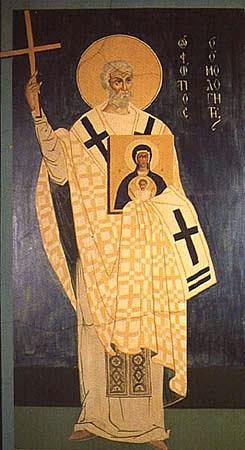We Are Men, Not Gods
Cornelius Falls to His Knees before St. Peter and Worships Him (1582) by Philips Galle (1537-1612)
"Arise: I myself am a man."--Acts 10:26
Christ, the Crucified and Risen One, the Author of Life, is both God and man, two natures united without division or confusion or admixture. Christians, though, even when divinized, are still men. Holiness can lead to confusion on this matter, as it did when Cornelius fell on his feet and reverenced the Holy Apostle Peter, who had to remind him, "I myself am a man." Even worse happened to Barnabas and Paul, when the priest of Dios almost led the crowd to offer bulls and wreaths to them in sacrifice, and they had to tear their cloaks and cry out, "Men, what things do you do? For we are men of like passions to you."
As Christians, we have the All-Holy Trinity dwelling within us from our Baptism, when we partook of the living water Jesus prophesied of to St. Photina, the Samaritan woman. Yet even though God dwells within us, that does make us gods: though the Lord made men little less than gods, yet we are still as the chaff that is blown away, or the flowers that spring one day and wither the next. Only through Christ do we have any divine power, for it is only by the working of the Spirit in Christians that miracles and divine happenings can occur.
What does this mean for us? It means we, even as Christians, are still men as are those who have not been illuminated: we have the same passions as them, and we have the same weaknesses; only Christ works in us to strength us and give us power beyond our nature. It means that we cannot attribute the glorious things the Lord does through us to our own actions: it is the Lord's working through us that has such effects. It means we must not view the wrongdoing of a Christian, whether a great and popular leader or merely one of us, as somehow a flaw in divinity: for the good we do is attributable to the Spirit's power and our cooperation, while the evil we commit is attributable to us and to the devil's inspirations, "for neither the world nor the devil can violate man's freedom; they can only subject it to temptation." We can see all of this even in Scripture: for instance, in the denials of St. Peter. As John Marshall Lang writes, "Holy Scripture is always faithful to fact. The men of the Bible are only men; and faults and errors are never concealed."
Let us not, then, place too much trust in ourselves and our own abilities: for we truly are all not Gods, but men, "and there is no man who lives and does not sin"; thus, we need the constant energy of the Trinity within us to be able to do the works of the Lord and to grow ever more divinized and ever deeper in union with God. Let us, then, always pray to the Lord, that is Spirit may ever further inflame us with His holy energies. Christ is risen!
"No one constituted from clay and mutable matter can maintain himself forever superior to a human blunder. Indeed, it happens that a trace of some blemish clings even to the best of men."--St. Photius of Constantinople, discussing the faults of our Holy Fathers
Nota Bene: The quote beginning "for neither the world..." is from Unseen Warfare II.7, which is St. Theophan the Recluse's Slavic revision of St. Nicodemus the Hagiorite's Greek edition of Lorenzo Scupoli's Spiritual Combat and Path to Paradise; the quote is from the translation by E. Kadloubovsky and G.E.H. Palmer (Crestwood, NY: St. Vladimir's Seminary Press, 1987). The quote from John Marshall Lang is from his Gideon and the Judges: A Study Historical and Practical (Grand Rapids, MI: Fleming H. Revell Company, 1890), p. 166. The quote from St. Photius is from his On the Mystagogy of the Holy Spirit §70, translated by Holy Transfiguration Monastery (Long Island, NY: Studion Publishers, Inc., 1983).
Text ©2014 Brandon P. Otto. Licensed via CC BY-NC. Feel free to redistribute non-commercially, as long as credit is given to the author.



Comments
Post a Comment